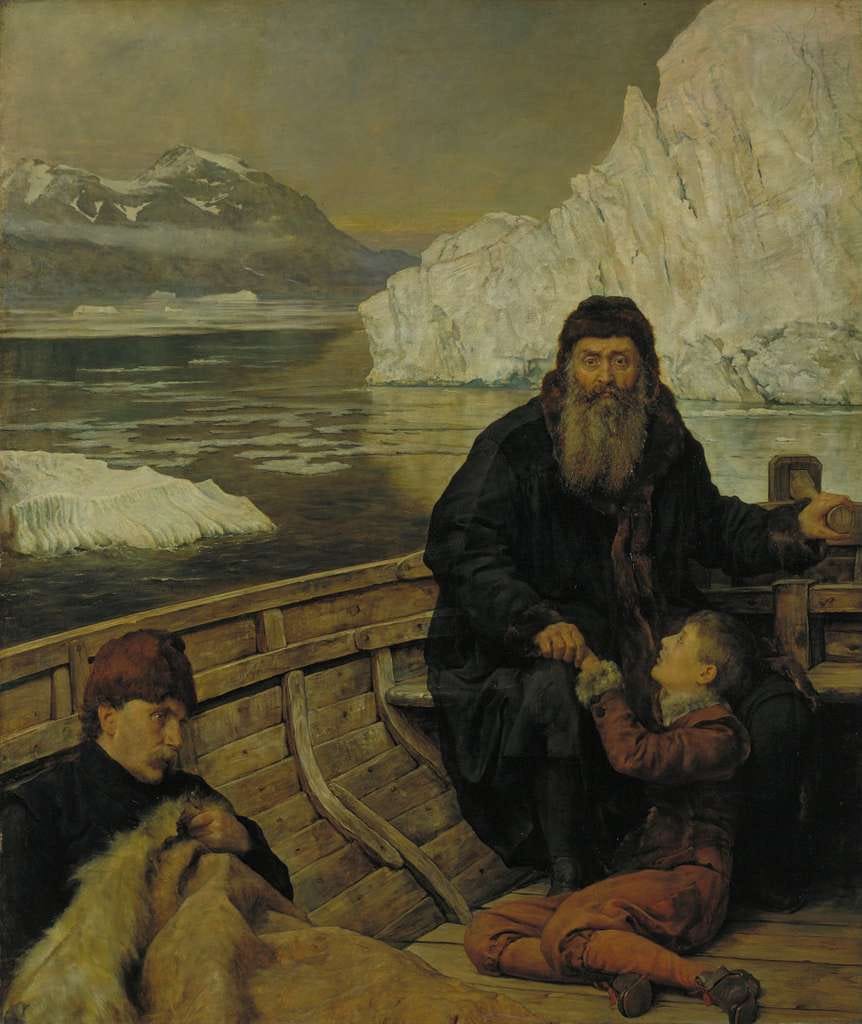Our Word of the Week, voyage, is one that for English speakers has the fresh smell of the salt sea about it, and the wind in your face. I’ve read the letters of the boy and then young man Horatio Storer, who would later become one of the most renowned doctors in America — and remember with a sort of wistful envy his writing home from a schooner in the Strait of Canso, near where we live in Nova Scotia in the summer, and its being wintertime, and cold and stormy, but tremendously exciting. Storer was there as a Harvard boy in his teens, to examine the fish and other sea-life, and the maritime flora, but every page seems to vibrate with wonder and the delight of danger. In the most important way, though, Horatio didn’t go so far after all, because he kept the Christian faith he was brought up in — twenty years later he became a Roman Catholic, and a close friend of the bishop in Rhode Island who founded the college where I taught for 27 years, but that’s another story. I say he kept the faith, because in his letters home he told his mother and father that he managed to get ashore for Christmas services among a congregation of Methodists. According to the boy, they sang really well, and he joined in.
A voyage, now, seems to imply for us the ocean or something like an ocean, such as the vast reaches of outer space, or even the Sahara, perhaps while riding on that “ship of the desert,” the grouchy but eminently useful beast called the camel. It wasn’t always so, but let’s keep that sense in mind. We might consider intellectual and spiritual voyages, not crossing the street, or taking the A-train, or hailing a cab. In Shakespeare’s The Tempest, the men aboard the ship crossing from Tunis to Naples meet more than a storm; they must confront the evil they have done, and King Alonso makes the complete crossing from unrepented sin to kneeling at the feet of the baby girl, now a young woman, whom he had intended to murder, along with her father Prospero, years and years before. Last year I read, one podcast after another, about another voyage, this one down Old Man River, with Huckleberry Finn and his friend and protector the runaway slave Jim; and it’s a voyage of self-discovery for Huck, though he is not conscious of intending any such thing.
Emily Dickinson wrote that “There is no frigate like a book / To take us lands away,” but that was when cheapjack books weren’t written for niche audiences to keep them exactly where they are. I agree with her, if you’re reading the adventures of Horatio Hornblower, or if you travel with Sir Walter Scott’s heroes in the old tumultuous times of Robert the Bruce, or in the court of the intelligent and amiable but wildly inconsistent King “Jamie” the First, the Scotsman on the throne of England. The magazines I collect from the late 1800’s are full of travelogues, as so much of the world had not yet been mapped and explored. But I guess we might also turn Dickinson’s phrase around and say that there is no book like a frigate — a ship on the ocean, or some other conveyance over a vast and unknown space. Where are we going? Where do we wish to go? What do we seek? Man in this world is never the mere occupier of a station, or at least he shouldn’t be. We put down roots, we love or ought to love the land of our birth, but we are also always on the way: Homo viator, man on the road.
The origin of the word voyage confirms this sense. As soon as you see the diphthong oi (oy) in an English word, you should immediately think, “Aha, it’s the Norman French again!” Most of the time you’ll be right: toil, join, foil, broil, coin, and many others, including our word today, voyage. The French word voyage, entering English in the Middle Ages, descends from the Latin term viaticum. That’s the adjective viaticus turned into a neuter noun, meaning something that pertains to being on the way (Latin via), such as money or provisions. Hence the Eucharist that is given to a dying person in the Last Rites is called the viaticum. It is food for the journey. When the Venerable Bede wrote about the life of the first religious poet in the Anglo-Saxon tongue, the illiterate cowherd Caedmon, he recounts how in his last few days, the good man was in the abbey’s infirmary, at peace with God and all men, and he asked for the Eucharist. That surprised everybody, because Caedmon did not seem to be near death. But they brought him the “heavenly wayfarer’s food,” and Caedmon asked how long it was before the brothers would rise to sing matins. “A little while yet,” his friends said. “Well then, we’ll wait till they do,” said Caedmon, and thus he passed away calmly and peacefully. That gave J. R. R. Tolkien the inspiration for the “waybread,” the light and all-sustaining food his elves carry with them. For a voyage can also cross the gulf between earth and heaven: and be as near as the next moment.
Listen to this episode with a 7-day free trial
Subscribe to Word & Song by Anthony Esolen to listen to this post and get 7 days of free access to the full post archives.












